The Wake-Up Call of the 2023 Okta Breach
ThunderSecurity
11/30/20233 min read


In late 2023, Okta, a prominent identity management company, disclosed a security breach in its customer support database. This breach compromised the data of all 18,000 customers. Initially, Okta downplayed the impact, stating that only 1% of customers were affected. However, further investigation revealed a more significant intrusion.
The breach occurred in October when hackers exploited a stolen login credential to access Okta's customer support case management system. They were able to download records containing customer support user details, including names, emails, phone numbers, and employee roles. More concerning was the fact that the database also contained session tokens uploaded by customers, which could potentially be used to access underlying systems. Okta, however, stated that there were no signs of exploitation at that time.
The breach not only affected customer support information but also reports containing contact details of Okta-certified users and some in their customer Identity Cloud product. The impact on Okta's 6,000 employees was still being assessed. This extensive intrusion highlighted the vulnerability of even reputable identity providers to sophisticated attacks.
From this incident, several lessons can be learned. Firstly, it is essential to recognize that total security does not exist, and even renowned companies are susceptible to sophisticated attacks. Protection can be achieved through open collaboration and leveraging diverse expertise.
Centralized systems inherently introduce some level of risk, as demonstrated by Okta's case. Both vendors and customers must prioritize robust safeguards by promoting transparency and accountability on both ends.
Access management, authentication practices, monitoring capabilities, and regular audits should not be overlooked. These core security fundamentals must remain top priorities, irrespective of technological advancements.
Lastly, it is crucial to understand that people are now considered the newest perimeter. Continuous end-user training is essential in defending against social engineering techniques used in many breaches.
The Okta breach highlighted the importance of prioritizing security through a shared responsibility model. As the incident showed, centralized platforms concentrate risk - even the most reputable identity providers can encounter vulnerabilities.
This reality underscores the need for continuous vigilance from all parties. Both vendors and integrating organizations must commit to strengthening protections moving forward.
At the provider level, transparency and accountability are paramount. Identity managers should openly communicate their technical security practices, issues found through audits or past incidents, and detailed plans for remediating weaknesses.
It is equally crucial for vendors to take ownership of mistakes, in order to reinforce accountability. Admitting faults and fully committing to resolving defects builds trust over time.
Customers also hold responsibility. Independent validation of security claims and internal ownership of access management responsibilities empowers resilience.
Only through open collaboration on respective due diligences can the digital community jointly safeguard evolving risks. The lessons of Okta emphasize that resilience depends on cooperation, not isolated efforts alone. A balanced, shared mindset towards ongoing risk mitigation is needed.
The key is that no single party alone ensures protection in such a connected environment. Only through open collaboration on respective duties can the digital community jointly progress security resilience after significant incidents like Okta's breach.
At ThunderSecurity, we advocate for a partnership-based approach. We believe that no organization can ensure robust security alone in today's complex environment. To achieve this, we recommend comprehensive risk assessments and identity integration testing to identify vulnerabilities. Additionally, strategic awareness training and incident planning exercises are vital for building resilience. Our proactive approach focuses on continuous improvement across technical, human, and organizational dimensions to ensure enduring protection.
By fostering open collaboration and applying lessons learned from previous incidents, organizations can harden defenses together against emerging threats. Resilience stems from mutual accountability across interdependent roles.
Our services are available to any company seeking to bolster protections through a partnership-based approach. The future of security assurance lies in viewing it as a cooperative sport, with varied perspectives unified in safeguarding sensitive systems.



